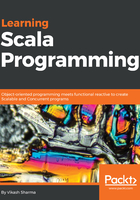
AnyVal
The latter, AnyVal, represents values not implemented as objects in the underlying runtime system. Scala has some predefined numeric and non-numeric value classes as shown in the class hierarchy.
It's possible to define user-defined value types as well, with some conditions applied. Remember I asked you to take a closer look at the source of the Int.scala file? You may have noticed that there are no val or var declarations in the class Int that extends AnyVal. This is one of the constraints of defining a subtype of AnyVal. One of the reasons you might consider defining an AnyVal type is to avoid object instantiation at runtime. Some of the constraints are:
- It must have a single val parameter that is the underlying representation. It means that if you declare class Num(val underlying: Int) extends AnyVal, then the compile time representation of it will be of type Num, but at runtime it'll be converted to Int, and methods defined within will be used as statics.
- It must define only def, no val, var, nested classes, traits, or objects.
- It can only extend universal traits, traits that extend only the super type Any.
- It can't be used for pattern-matching, or type tests.
Scala's implementation of AnyVal includes nine implementations. Out of them, Byte, Short, Int, Long, Char, Float, and Double are numeric value types, while Boolean and Unit are non-numeric types.